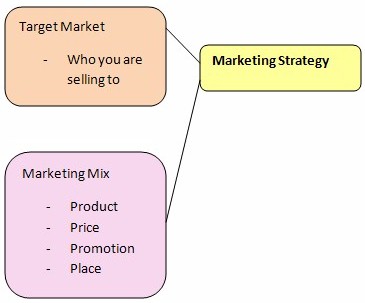Marketing Plans

| Marketing
Strategies
Marketing Plans |
 |
| Marketing
Strategy |
A Marketing Strategy is composed of 1 - Target Market - basically "who" you are selling to - your "target market segmentation" 2 - Marketing Mix (the marketing mix being the 4 p's) - the controllable variables - the things you can do something about 
The things you cannot do anything (the uncontrollable variables) are the 6 environments within which marketing exists Your choice of Target Market, and the way you select the 4P's are influenced by your company's strong capabilities, things you aren't good at, chances of doing something new, and challenges from the competition, also known as
|
| Marketing
Strategy |
2 - Marketing
Mix (the marketing mix being the 4 p's)
|
.
So once you have a "Marketing
Strategy" developed, you can the create a "Marketing Plan"
if you add in the time related
details as to what is done when

And a "Marketing Program"
for a medium or large sized firm is simply several Marketing Plans for
example if you are Ford,
you'd have a Marketing Plan
for trucks, a Marketing Plan for small passenger cars, a Marketing Plan
for large industrial vehicles, etc.
Below is an example of how
SONY divides up one of their divisions into different Marketing Plans
from http://www.sony.com/SCA/outline/electronics.shtml


| Key
Points |
So if someone
asks you
"What is a Marketing Strategy?", you can tell them it's the Target Mkt + the 4Ps. If someone asks you
If someone asks you to develop a whole marketing program for a firm, you put together several marketing plans for all the different products. WTGR |

| Key
Points |
The phrase "Marketing
Strategy" has become increasingly important in business. In the 1990's,
people used the words "Marketing Strategy" all the time without specifically
employing the proper meaning of the word. In recent cases, it has become
more important to use the term properly and a number of newspaper stories
talk about how companies need to have a good "Marketing Strategy" - because,,,
without one, they are in big trouble.
WTGR |

...

|
.
- because of the particular usefulness of this article, we have included the full text available at the link below - you should read this www.witiger.com/marketing/article~marketing~strategy.htm the following text comes from the Sept 23rd, 2002 story "Marketing strategies for start-up businesses are hit-and-miss affairs. Unfortunately for a large percentage of those businesses, it is more miss than hit. Up to 40% of Canadian businesses fail in their first year. By year four, that rate has jumped to as high as 70%, according to Statistics Canada. Key among the reasons behind business failure is marketing." "David Frey, president of
Marketing Best Practices Inc., of Houston, Tex., says it should be the
first element of any business plan. "Your marketing plan is where you prove
your concept," he says.
"This involves thinking through
such questions as: "Does my market want my product or service? Do I have
proof that my market will pay for my product or service?"
What competition will I face and how will those companies respond? If you can't sell it, you shouldn't produce it," he says.
A marketing plan is "a recipe for getting it right," Ms. Bishop says. That recipe should include goals, marketing tactics and specific actions to execute both. .
"It should be aimed at a specific customer and be grounded in sound research."
The key is to listen to the customer, to what the marketplace is saying and to what the competition is saying. "Your business ultimately depends, not on customer satisfaction but on having them return as loyal customers." (which leads to C.L.V.)
|
|
|
CONTACT I MAIN PAGE I NEWS GALLERY I E-BIZ SHORTCUTS I INT'L BIZ SHORTCUTS I MKTG&BUSINESS SHORTCUTS I TEACHING SCHEDULE |
| . | |
| MISTAKES ITEXTS USED I IMAGES I RANK IDISCLAIMER I STUDENT CONTRIBUTORS I FORMER STUDENTS I | |
| . |